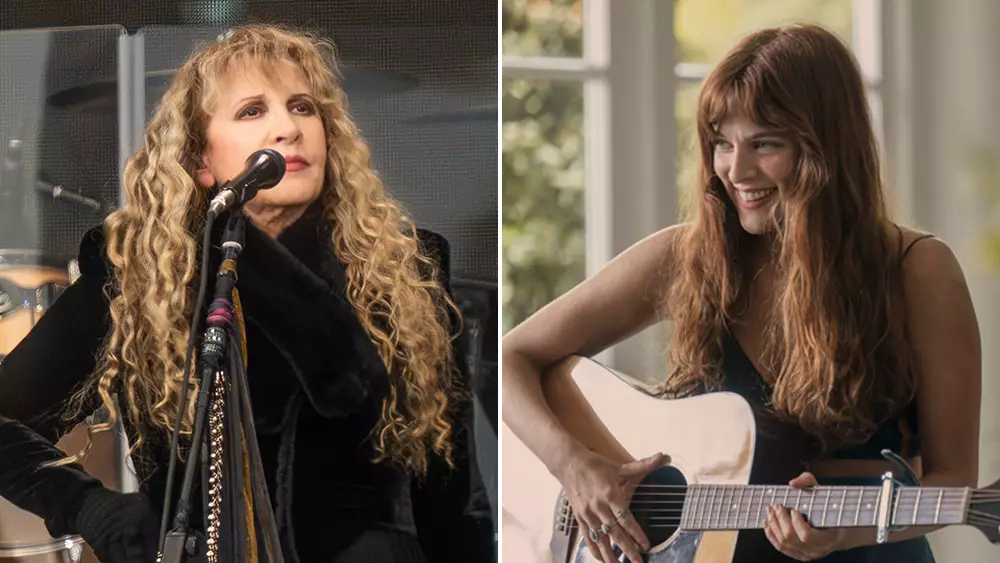Stevie Nicks, a luminary of rock music and a cornerstone of Fleetwood Mac, recently shared her thoughts on the Prime Video series *Daisy Jones & The Six*, which has captured the attention of both fans and critics alike. Based on Taylor Jenkins Reid’s novel, the show intertwines fiction with a nod to Nicks’ own storied past, including her intricate relationship with fellow band member Lindsey Buckingham. Interestingly, Nicks initially approached the series with skepticism, fearing it might not do justice to her life experiences. However, her eventual viewing led to a surprising admiration and some intriguing suggestions for the show’s potential future.
In a candid conversation with *Rolling Stone*, Nicks confessed that she wasn’t particularly enthusiastic about watching the series. “I didn’t even want to see it, because I thought I was going to hate it so much,” she revealed. Yet, under the circumstances of being confined to her condo in Los Angeles with COVID-19, she found herself drawn into the narrative. This situation created an emotional backdrop, allowing her to reflect on her own life while watching the fictional portrayal on screen. The depth of her engagement with the characters became apparent as she examined the personality traits of the actors, particularly Riley Keough, who plays Daisy Jones.
Nicks noted the stark differences between herself and Keough’s character, which brought to light the more collaborative and peacekeeping roles she and Christine McVie adopted during their time in Fleetwood Mac. The rock icon expressed a desire to potentially collaborate with Keough, indicating a personal connectivity that she felt amidst the drama. This speaks to an intriguing idea: that art, even when dramatized or fictionalized, can resonate deeply with those who lived a version of it.
Critically examining the performances, Nicks had high praise for actress Suki Waterhouse, who portrayed McVie. She appreciated Waterhouse’s embodiment of Christine’s essence and style, lamenting that the real McVie did not live to see it. This sentiment illuminates Nicks’ connection to the past, highlighting a longing for her late friend’s involvement in modern interpretations of their shared history.
Similarly, she applauded Sam Claflin’s portrayal of Billy, observing how closely his performance mirrored Buckingham in both appearance and essence. The project seems to have rekindled Nicks’ nostalgia for her own past, serving as both a tribute and a reminder of the band’s illustrious yet tumultuous history.
As the conversation steered towards the show’s first season finale, Nicks proposed a thought-provoking narrative direction: what if Billy, following a family tragedy, sought to reconnect with Daisy to create a powerful final album reminiscent of her own aspirations with Buckingham? Nicks expressed her enthusiasm for this storyline, remarking on the support from executive producer Reese Witherspoon and Keough. Such an idea reflects Nicks’ deep understanding of story arcs—that thematic resolutions in music often parallel real-life experiences of love, loss, and artistic unity.
However, despite the interest, Nicks acknowledged the challenges posed by the busy schedules of the cast, especially Keough’s rising stardom. The future of *Daisy Jones & The Six* remains uncertain, as executive conversations hint at both interest in continuation and a recognition of constraints. Nicks’ vision for a second season is a testament to the show’s impact—not just on audiences, but on the very icons who inspired its narrative.
Reflecting on the achievements of *Daisy Jones & The Six*, including its recognition at the Emmy Awards, it’s clear that the show has cemented its place in the cultural landscape, even if it may not extend beyond a single season. Stevie Nicks embodies the very spirit of rock ‘n’ roll—embracing transformation while remaining steadfast to her roots. The interplay of reality and fiction that the series presents opens a larger dialogue about how artists view their pasts in the light of modern storytelling.
Ultimately, Nicks’ engagement with the show sheds light on the potential for art to facilitate new conversations around legacy and creativity. Whether or not there will be a second season remains in limbo, but the connections forged through this narrative ensure that Stevie Nicks’ legacy, along with that of her contemporaries, will continue to inspire new interpretations for years to come.
